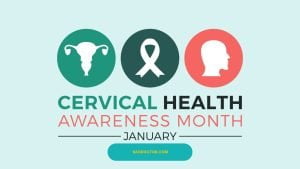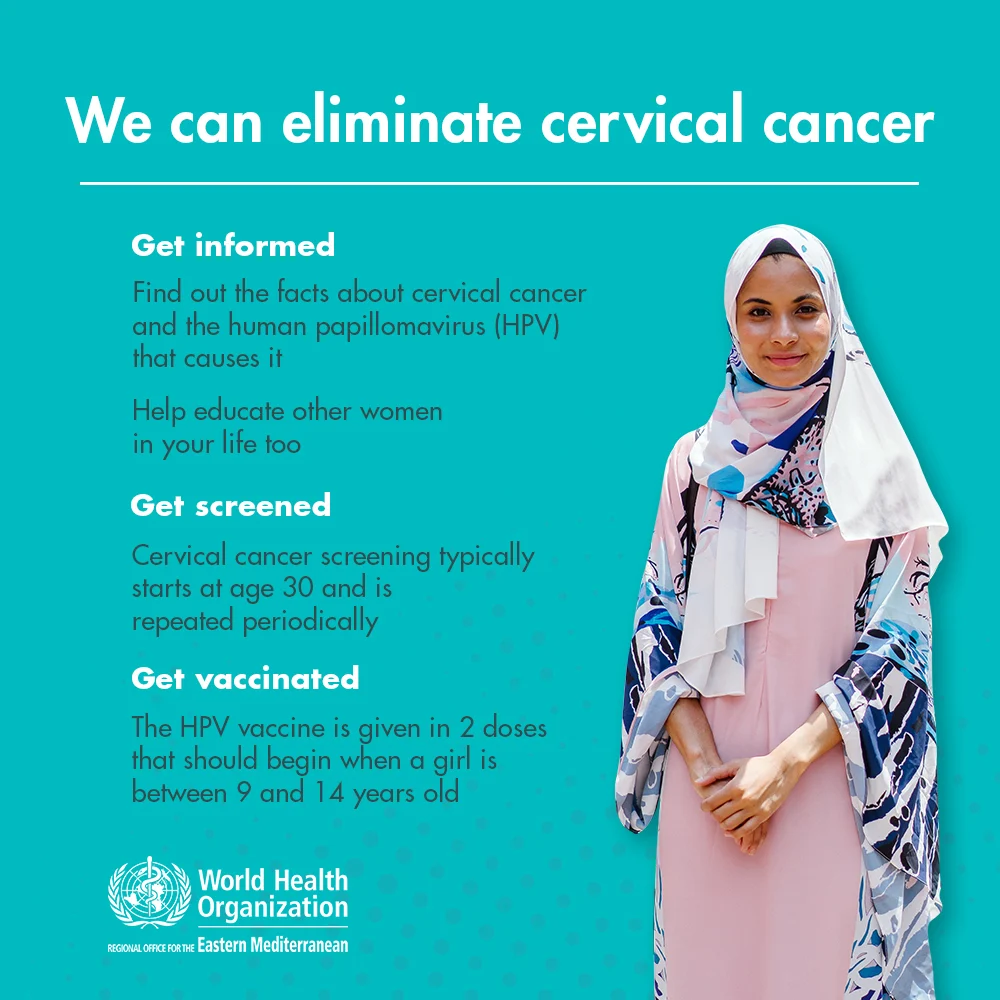
Women are the pillars behind the success of our lives.They serve as a wife, a daughter, a mother, a grandmother as well as a daughter-in-law. One great Indian scholar, social worker and politician rightly said these words-
I measure the progress of a community by the degree of progress which women have achieved.
B. R. Ambedkar
As such, their health matters a lot and amongst the health problems, Cervical [a part uterus through which a childbirth takes place] health stands out the most.
Cervical health is an important part of women’s overall health and wellbeing, yet it often goes overlooked. Every year, January is designated as Cervical Health Awareness Month, a time to raise awareness of the risk factors, prevention, and treatment of cervical health problems.
This year, 2023, Cervical Health Awareness Month is an especially important reminder of the necessity of good health care for women.
Whether you’re a woman, a friend, or a family member, here is what you need to know about cervical health and how to celebrate and support Cervical Health Awareness Month.
I recently published an article on 7 different cancers in Men and Women and in that I have also written a short description of Cervical and uterine cancer. If you have not read it so far, you can read it here-
What is Cervical Health Awareness Month?
Before we dig into Cervical Health Awareness Month, let’s learn a bit about the anatomy of the female genital tract.
The female genital tract consists of the uterus, fallopian tubes, ovaries, cervix and the vagina [as shown in the picture below].

Here we will discuss the cervix- the neck- of the uterus.
Cervical Health awareness month is an annual campaign that focuses on increasing awareness of cervical health issues and promoting good health care for women.
Involving a variety of events, programs, and activities, each January community members, organizations, health care providers, and other stakeholders come together to discuss and celebrate cervical health and how to stay healthy.
Cervical Health Awareness Month is a great time to share information about the importance of cervical health and the aspects that impact women’s health, like HPV [Human Papilloma Virus] and HSV [Herpes Simplex Virus].
Notably, cervical health issues can be a significant health risk for women of all ages and backgrounds.
Although cervical health problems are often diagnosed and treated promptly, they are preventable and can be managed with regular screenings and appropriate care.
Cervical health problems affect many women, but they are also preventable through regular screenings and appropriate care. This is why cervical health awareness is so important.
Risk factors for cervical health problems
As with many health issues, risk factors for cervical health problems vary from person to person. Risk for cervical health problems can be increased by a variety of factors, including: –
- Age – Younger age is a risk factor for cervical health problems.
- Sexual activity – Having multiple sexual partners or engaging in multiple sexual activities without the use of condoms can increase the risk for cervical health problems.
- Reproductive Health – Having a sexually transmitted infection, having a low immune system, or being pregnant can increase the risk for cervical problems.
- Genetic factors – Certain genetic factors can increase the risk of cervical health issues.
- History of cervical issues – A previous diagnosis of abnormal cervical cells can increase the risk of cervical health problems.
- History of sexually transmitted infections (STIs) – A previous diagnosis of a sexually transmitted infection can increase the risk of cervical health problems.
- History of abnormal Pap test results – A previous diagnosis of an abnormal Pap test result can increase the risk of cervical health issues.
- Human Papillomavirus (HPV) infection – Most cervical health issues are linked to HPV infection.
- History of poor health – A previous history of poor health can increase the risk of cervical health problems.
Prevention and Screening
The best way to prevent cervical health issues is to take advantage of regular cervical health screenings. Most often, these screenings involve a Pap test and/or an HPV test.

The following are important cervical health prevention tips: –
- Know your health history: -Take the time to review your healthcare history and know the details of your past health issues. This can help you spot any patterns or issues that may be of concern.
- Stay up to date with screenings:- Cervical health screenings are an important part of maintaining health. Keeping track of your health screenings can help you identify any issues before they become serious.
- Practice safe sex:- Sexually active individuals should know the risks of their sexual activities. Using condoms and other safe sexual practices can lower the risk of contracting sexually transmitted infections (STIs) and can help lower the risk of cervical health issues.
- Maintain a healthy lifestyle:- Diet, exercise, and other lifestyle factors can impact your overall health. Maintaining a healthy lifestyle can help reduce your risk of cervical health issues.
Symptoms of cervical health problems
Abnormal cervical health can be difficult to identify. While some cervical health problems are accompanied by symptoms, many are not. This can make detecting cervical health issues challenging.
The following are symptoms of cervical health issues: –
- Abnormal bleeding – Bleeding between menstrual cycles may be a sign of abnormal cervical health. This bleeding can indicate an infection, a problem with the cervix, or other issues. –
- Abnormal Pap test results – Abnormal Pap test results are a common sign of cervical health issues. A variety of issues can cause abnormal results, including infection and/or issues with the cervix. –
- Discomfort during intercourse – Pain or discomfort during intercourse can be a sign of abnormal cervical health. –
- Abnormal discharge – A change in cervical discharge can be a sign of abnormal cervical health. –
- Persistent pain – Persistent pain in the pelvic region can be a sign of abnormal cervical health. –
- Intermittent pain – Intermittent pain in the pelvic region can be a sign of abnormal cervical health.
Treatment of cervical health problems
Treatment for cervical health issues varies depending on the specific issues detected. If you are having cervical issues like vaginal discharge that is colorless, white or foul smelling, you should consult your Gynecologist immediately. Your gynecologist may do the required cervical health tests to rule out either infection or cancer and then suggest a proper line of treatment.
The following are common treatments for cervical health issues: –
- Abnormal bleeding – Treatment for abnormal bleeding may include medication and/or surgery. I usually prescribe tab. Pause 500[Tranexamic acid] 2 times a day for 5 days.
- Abnormal Pap test results – Abnormal Pap test results may indicate an infection and/or issues with the cervix. Treatment for cervical health issues is dependent on the specific issues detected.
- Discomfort during intercourse – Treatment for discomfort during intercourse may include medication and/or surgery. An anti-inflammatory pain killer like Naproxen can help in this.
- Abnormal discharge – Treatment for abnormal discharge is dependent on the severity of the issue detected. Various treatments are available for this condition called leukorrhea. Abnormal discharge can be due to yeast, bacteria or trichomoniasis.
- I usually prescribe intravaginal pessaries- [tablets to be kept inside the vagina] that contain anti-fungal or an antibiotic or both. E.g. Candid V3
- Sometimes oral anti-fungal medicines like fluconazole are also prescribed in combination with azithromycin and metronidazole.
- If the response is not satisfactory, a gynae referral is given.
- Persistent pain – Persistent pain can be a sign of a more serious health issue. Treatment is dependent on the cause of the pain.
- Intermittent pain – Treatment for intermittent pain is dependent on the cause of the pain.
How to celebrate Cervical Health Awareness Month
Cervical Health Awareness Month is a great time to learn more about cervical health and how to protect your health.

Use this time to promote cervical health awareness and good health practices by: –
- Talking about cervical health with friends and family.
- Getting screened for cervical health issues.
- Practicing safe sex with sexual partners.
- Maintaining a healthy lifestyle.
- Supporting organizations that raise awareness about women’s health.
Ways to support Cervical Health Awareness Month
Cervical Health Awareness Month is a great time to get involved in activities that help to promote cervical health awareness. You can support cervical health awareness in a variety of ways, including: –
Resources for learning more about cervical health
Cervical Health Awareness Month is a great time to learn more about cervical health issues and how they can impact your health.
You can learn more about cervical health and women’s health by: –
- Reviewing educational materials on cervical health issues and risks.
- Visiting health care providers to discuss your health.
- Seeking additional information online and from trusted sources.
- Reading up on the history of cervical health and how it is celebrated every January.
The importance of good health care for women
Cervical health problems are an important health issue for women. While these issues can be challenging to manage, they are also often preventable and treatable.
Cervical health awareness is an important part of keeping women’s health healthy and promoting good health care for women. This is especially important in 2023, as the year marks the 28th anniversary of World Women’s Health Week.
With a theme of “Healthy lives and sustainable futures for all,” World Women’s Health Week is an important time to reflect on women’s health issues and celebrate cervical health awareness.
This year’s focus on cervical health can also help to highlight the importance of regular screenings and appropriate health care for women across the world.
Useful Resource-
Final thoughts on women’s health and Cervical Health Awareness Month
Cervical health issues can be challenging to manage, but they are also often preventable and treatable. Cervical health awareness is an important part of keeping women’s health healthy and promoting good health care for women.
This is especially important in 2023, as the year marks the 28th anniversary of World Women’s Health Week. With a theme of “Healthy lives and sustainable futures for all”, World Women’s Health Week is an important time to reflect on women’s health issues and celebrate cervical health awareness
Do share this article on social media by clicking the icons at the bottom of this article. You can also Click to Tweet-
Celebrating Cervical Health Awareness Month: What You Need to Know About Women's Health Share on XMy next article will be on a very important vitamin- Vitamin B12.



